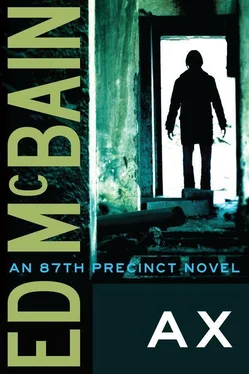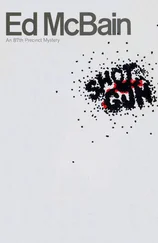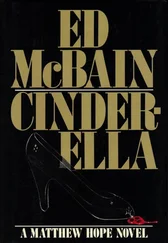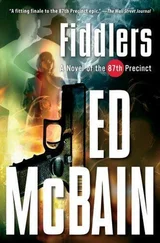“Best time of the year for Florida,” Phelps said.
“Certainly,” Forbes said.
“What’ve you got so far?” Phelps asked, changing the subject.
“Man’s name is George Lasser,” Carella said. “He was superintendent of the building.”
“That’s what I got from the tenants,” Hawes said.
“Any idea how old he was, Cotton?”
“The tenants put him in his late eighties.”
“Why’d anyone want to kill a man that old?” Forbes asked.
“Ready to kick off anyway,” Phelps said.
“We had a killing once over near Seventh and Culver,” Forbes said. “You know the area?”
“Mmm,” Carella said.
“Guy was a hundred and two years old. In fact, it was his birthday.”
“No kidding?”
“No kidding. Somebody shot him while he was cutting his birthday cake. Fell right into the damn thing, a hundred and three candles on it, one to grow on, you know. Guy dropped dead instantly.”
“Who did it?” Hawes asked.
“His mother,” Forbes said.
There was a short silence, and then Hawes said, “I thought you said the guy was a hundred and two years old.”
“That’s right,” Forbes said.
“Then how old was his mother?”
“A hundred and eighteen. She got married when she was sixteen.”
“Why’d she kill him?”
“She couldn’t get along with his wife.”
“I see. He had a wife, too, huh?”
“Sure.”
“How old was she?”
“Twenty-seven.”
“Oh, come on,” Hawes said.
“He thinks I’m kidding him,” Forbes said, pushing his elbow into Phelps’s ribs.
“No, he ain’t kidding,” Phelps said, laughing.
“Over in Homicide,” Forbes said, “we get all kinds.”
“I’ll bet you do,” Hawes said.
Phelps looked at his watch. “Well, time we was running along,” he said. “You boys keep us informed now, huh?”
“In triplicate, huh?” Forbes said.
“We’re surprised you came out at all on such a cold day,” Carella said.
“It ain’t so cold,” Forbes said. “Over in Homicide, boy, we get days you could freeze.”
“Listen,” Hawes said, as though suddenly inspired, “why don’t you fellows handle this case yourselves?”
“Nope,” Forbes said.
“Not allowed to,” Phelps said.
“Against regulations,” Forbes said.
“Homicide is to be investigated by the precinct handling the initial complaint,” Phelps said.
“Sure, but I thought—”
“Nope.”
“I thought,” Hawes said, “that since you’ve had experience with geriatric cases, perhaps you’d—”
“What kind of cases?”
“Geriatric,” Hawes said.
“Jerry who?”
“Well, I just thought it was an idea,” Hawes said.
From the corner of his eye, Carella saw the patrolman at the basement steps signaling to him.
“Excuse me,” he said, and walked rapidly to the steps. “What is it?” he asked the patrolman.
“Steve, we got a guy outside, found him wandering around in the alley without a jacket on or anything. I mean, this ain’t weather to go running around in your shirtsleeves, you know what I mean? It’s forty-two degrees out there.”
“Where is he?” Carella said.
“We got him upstairs.”
Carella turned and gestured to Hawes. Hawes moved away from the Homicide cops.
“What is it?”
“Patrolmen found a wanderer in the alley. In his shirtsleeves.”
“Uh-oh,” Hawes said.
The man they had found wandering in the alley was a huge Negro wearing only dungaree trousers and a white shirt open at the throat. He was very black, and very mean-looking, with a scar across the bridge of his nose and with enormous muscles bulging beneath the white cotton of his shirt. He was wearing sneakers, and he seemed to be balancing himself on the balls of his feet as Carella and Hawes approached, almost as though ready to begin throwing punches. A patrolman was standing alongside him with his nightstick in his hands, but the Negro paid no attention at all to him. With his eyes slitted, his legs widespread, and his weight balanced, he watched the approaching detectives.
“What’s your name?” Carella said.
“Sam.”
“Sam what?”
“Sam Whitson.”
“What were you doing in the alley out there, Sam?”
“I works here in this building,” Whitson said.
“What do you mean?”
“I works for Mr. Lasser,” Whitson said.
“Doing what?” Carella asked.
“I chops wood for him,” Whitson said.
There was a deep silence for the space of a heartbeat. Carella glanced at Hawes and then back to Whitson. The two patrolmen—the one who had been standing alongside Whitson with his nightstick at the ready, and the one who had come to fetch Carella—both stepped a pace backward from the huge Negro, their hands moving imperceptibly toward their service revolvers.
“What were you doing in the alley, Sam?” Carella asked.
“I tole you,” Whitson said. “I works for Mr. Lasser. I chops wood for him.”
“You were chopping wood out there?”
“Yes, sir,” Whitson said, and then shook his head violently. “No, sir. I was gettin’ ready to chop my wood, yes, sir.”
“How were you doing that?” Hawes asked. “Getting ready, I mean.”
“Well, I was on my way to get the ax.”
“Where was the ax?”
“We keeps it out in the toolshed.”
“Where’s that?”
“Out back.”
“Out back where?”
“In the toolshed,” Whitson said.
“You trying to get smart with me, Whitson?” Hawes asked.
“No, sir.”
“Well, take my advice, don’t.”
“I wasn’t,” Whitson said.
Carella, watching, said nothing. There was a mean and menacing look on the Negro’s face, and his size was frightening. He looked as if he were capable of tearing the building down with his bare hands, and it did indeed seem as if he were answering Hawes’s questions in a deliberately evasive and somewhat snotty manner, perhaps in order to provoke a fight. Carella had no doubt that if this man decided to begin swinging, he would not stop swinging until everyone and everything in sight had been reduced to rubble. Confronted with a man as strong and as big as this one, the best thing anyone could do would be to tip his hat, say “Good afternoon,” and get the hell home. Unless you happened to be a cop, in which case you wondered why Whitson had been roaming around in an alley in his shirtsleeves with the temperature at forty-two degrees and a dead man with an ax in his head there in the basement. You wondered about such things, and you let Whitson know that you expected straight answers to straight questions without any crap, while all the time you figured he might just possibly reach out and pick you up in one hand and squeeze you to a pulp in his fist. Listen, who told you to become a cop?
“You want to tell me where that toolshed is?” Hawes said.
“I already tole you. Out back.”
“How about pinpointing it for me, Whitson?”
“What do you mean?”
“Tell me where it is exactly.”
“Near the clothesline.”
“Where’s that?”
“Near the pole.”
“And where’s that?”
“Out back,” Whitson said.
“Okay, wise guy,” Hawes said. “If that’s the way you—”
“No, hold it a second, Cotton,” Carella said. Listening to Whitson, he had suddenly realized that the man was really trying his best to cooperate. But he happened to look surly and evil, and his size was terrifying, and he wasn’t really very bright. So he stood there like a huge, blinking monster ready to wreak seven kinds of havoc, answering questions as well as he could, and coming across only as a wise guy spoiling for a fight.
Читать дальше












